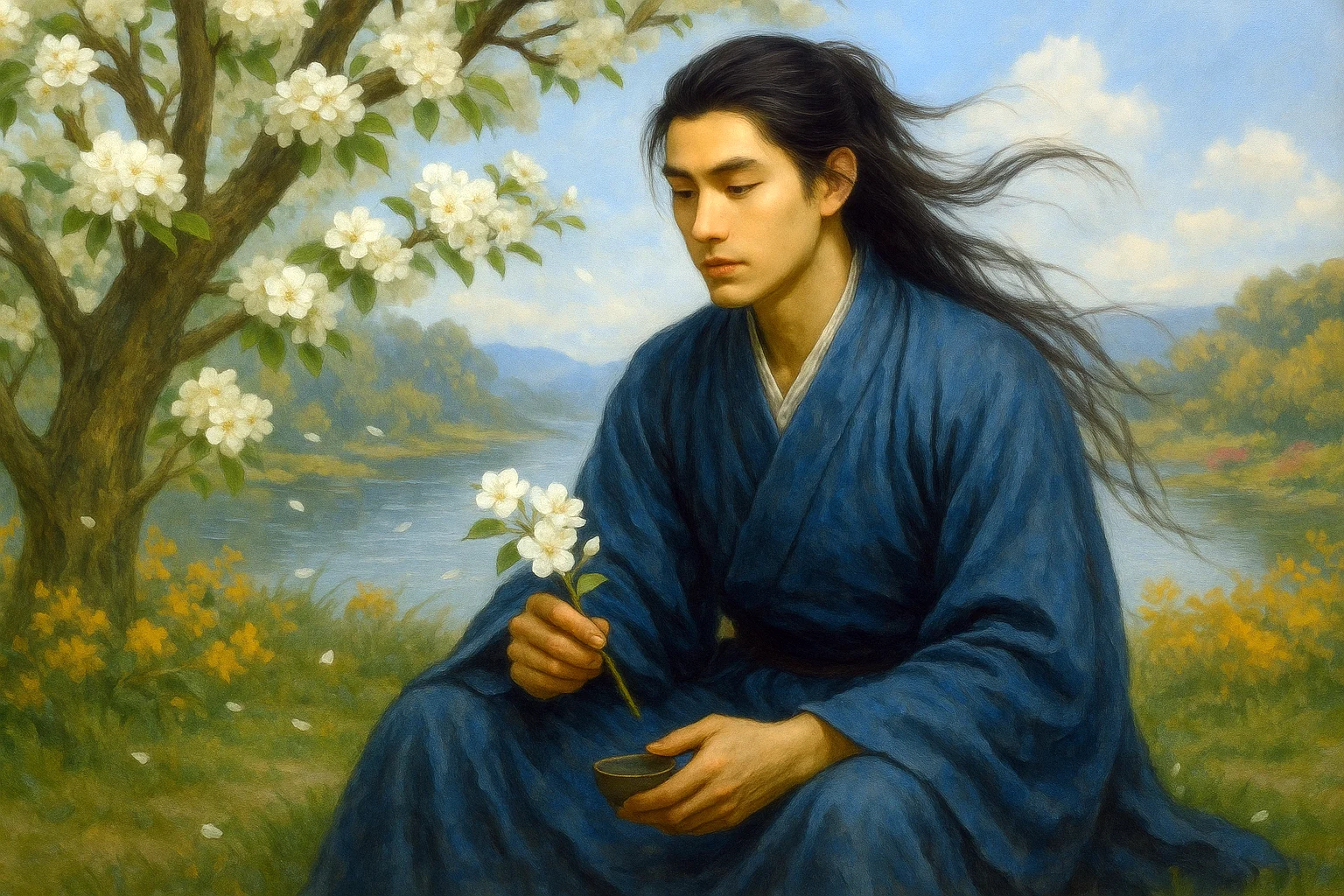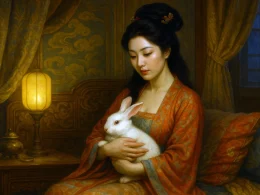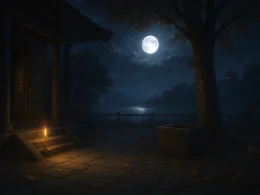The silver lake meets the fading sky,
And mighty waves carry the sinking sun.
Wind stirs the dusk of Yunmeng's marsh,
While autumn moonlight floods Dongting's expanse.
Fishermen’s fires blink along the sand,
Boats of traders drift through rising mist.
From Western Gardens to Southern Shores—
All is lost in endless wandering.
Original Poem
「宿洞庭」
李端
白水连天暮,洪波带日流。
风高云梦夕,月满洞庭秋。
沙上渔人火,烟中贾客舟。
西园与南浦,万里共悠悠。
Interpretation
This work was composed during an autumn night when Li Duan, while traveling or boating, lodged by Dongting Lake—a storied body of water in northern Hunan that has inspired literati for centuries, particularly in its autumnal splendor. Amidst the lake's moonlit expanse and the comings and goings of merchants, the poet channels his observations into this meditative five-character regulated verse. Though titled "Lodging," the poem transcends mere description, merging landscape with introspection in a quintessential Tang-era fusion of nature and emotion.
First Couplet: "白水连天暮,洪波带日流。"
Bái shuǐ lián tiān mù, hóng bō dài rì liú.
Pale waters merge with twilight skies;
Great waves bear the sun’s dying light.
The opening lines capture the vast, horizonless expanse of Dongting at dusk. "Pale waters" (白水) and "great waves" (洪波) magnify the lake’s grandeur, while "dying light" (带日流) animates the scene with a fleeting, almost mournful radiance—establishing the poem’s majestic yet transient tone.
Second Couplet: "风高云梦夕,月满洞庭秋。"
Fēng gāo Yúnmèng xī, yuè mǎn Dòngtíng qiū.
Winds howl through Yunmeng’s gloaming;
The moon brims over Dongting’s autumn.
Here, the poet weaves regional lore into the nightscape. "Yunmeng" (云梦), an ancient marshland, and "Dongting" (洞庭) anchor the scene in Chu’s mythic geography. The "brimming moon" (月满) casts the lake as a vessel of melancholy, its autumnal fullness echoing the poet’s solitude.
Third Couplet: "沙上渔人火,烟中贾客舟。"
Shā shàng yú rén huǒ, yān zhōng gǔ kè zhōu.
Fishermen’s fires dot the sands;
Merchant boats drift through mist.
The focus narrows to human vignettes—the flicker of fires and spectral boats (烟中舟)—infusing the sublime landscape with earthly rhythms. These fleeting signs of life amplify, rather than dispel, the prevailing solitude.
Fourth Couplet: "西园与南浦,万里共悠悠。"
Xī yuán yǔ nán pǔ, wàn lǐ gòng yōuyōu.
From Western Gardens to Southern Shores,
A thousand miles dissolve into one endless sigh.
The closing lines telescope space and memory. "Western Gardens" (西园), evoking Chang’an’s cultured past, and "Southern Shores" (南浦), symbolizing exile, frame the poet’s displacement. The "endless sigh" (悠悠) resonates beyond geography—a lament for all that slips beyond reach, yet endures in the heart.
Holistic Appreciation
This poem presents an autumn night scene of Dongting Lake through the lens of a traveler, unfolding with distinct layers and profound artistic conception. The first half depicts the grandeur of nature, while the latter half focuses on human activity, culminating in the poet's emotions—a classic "opening-development-turn-conclusion" structure. The opening couplet begins with majestic imagery, portraying the dynamic interplay of lake and sky; the second couplet captures the lofty serenity and crisp chill of the autumn night, creating a tranquil and ethereal atmosphere; the third couplet introduces fishermen and merchants, infusing the scene with vitality; and the final couplet reflects on "Western Garden and Southern Shore," expressing the lingering nostalgia of a wanderer far from home. Here, scene and sentiment merge seamlessly, leaving lasting resonance.
Artistic Merits
The poem’s defining feature is its expansive scenery and clear progression, moving from the meeting of water and sky to the hazy moonlit night, then to fishing boats and bustling trade, before settling into the solitude of endless wandering. Li Duan masterfully employs parallelism and place names to blend vast landscapes with personal reflection. The diction is elegant and the mood far-reaching—phrases like "white water merging with sky," "surging waves bearing the sun," and "fishermen’s fires on the sand" are richly evocative. Emotion remains implicit, deeply embedded within the scenery, exemplifying the High Tang tradition of "channeling feeling through landscape."
Insights
Amidst the splendor of nature, a traveler’s heart still harbors longing and rootlessness. Though Dongting’s autumn is picturesque, the poet’s gaze turns inward—not just to the external world, but to the emotions it stirs. Through images of fishing fires, merchant boats, and the autumn moon, we sense a yearning for home and an awareness of life’s transience. The poem teaches us to cherish the present, to embrace both the solitude and magnificence of life’s journey—much like that moon over Dongting, illuminating both the dust of the road and the quiet depths of the human heart.
About the Poet

Li Duan (李端, c. 743–785), a native of Zhaoxian in Hebei Province, was among the "Ten Literary Talents of the Dali Era" during the Mid-Tang period. He excelled particularly in five-character regulated verse, crafting poetry of refined elegance and subtle nuance. His works frequently explored themes of reclusive living and the melancholy of separation, with over 250 poems preserved in the Complete Tang Poetry anthology.












